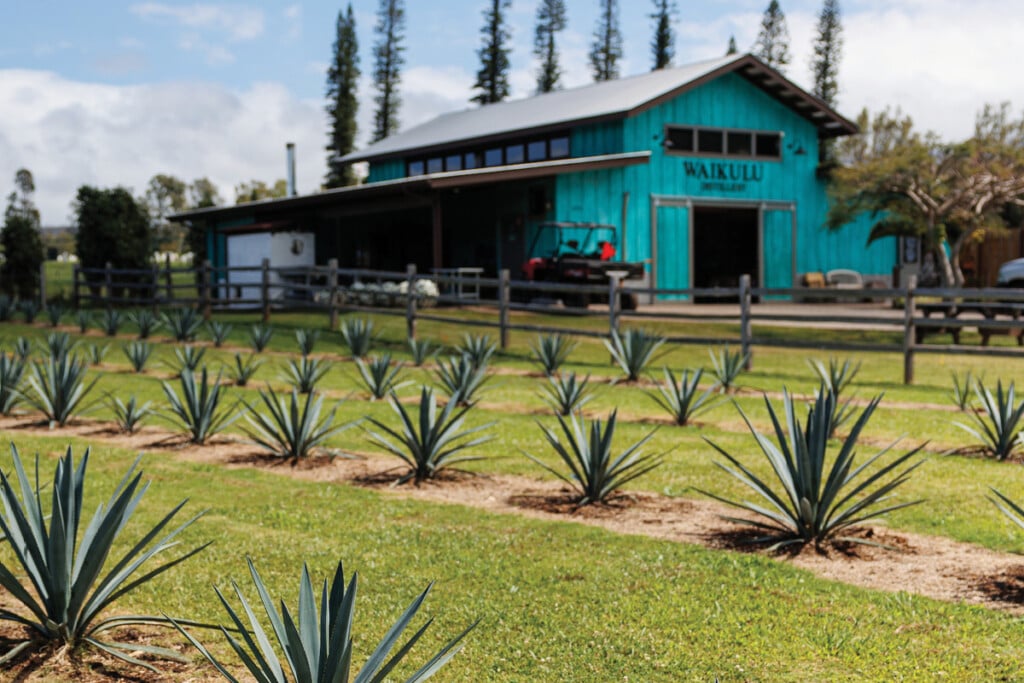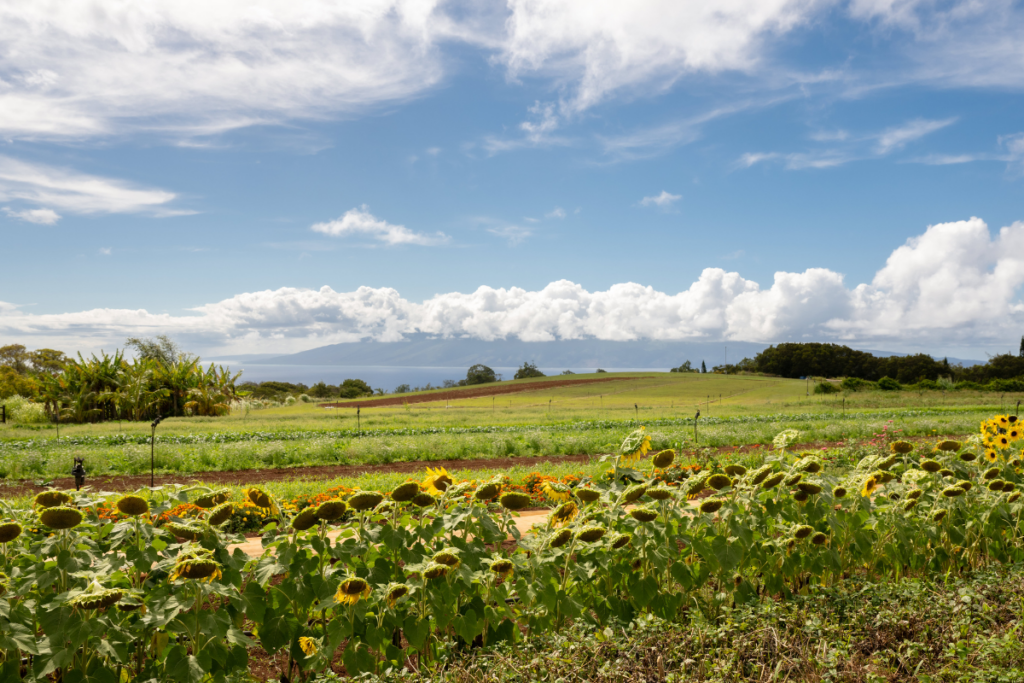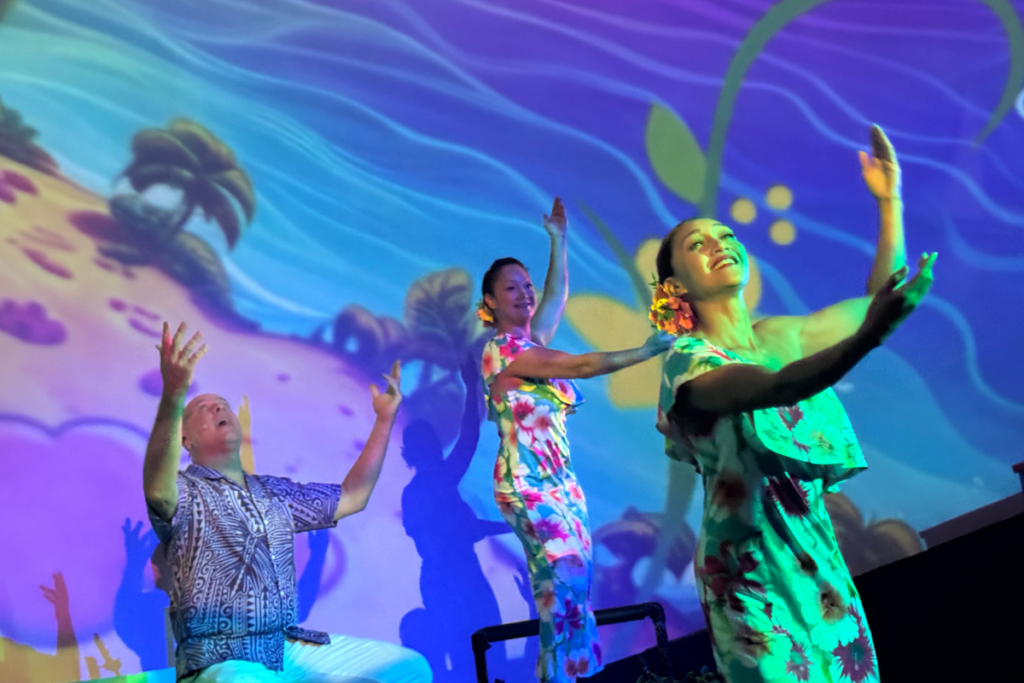Here’s Where to Experience Hawai‘i’s Only Blue Agave Distillery
Waikulu Distillery on Maui combines sustainable practices with award-winning craftsmanship to create exclusive farm-to-bottle spirits.

Tequila lovers are in for a treat at Waikulu Distillery, Hawai‘i’s only producer of blue agave spirits. Located in Makawao, this farm-to-bottle operation began as a horticulture experiment and has grown into an award-winning distillery crafting libations exclusive to Maui.
“My plan wasn’t to make it an enormous distillery, just something that could get to a comfortable size, turn a profit and be enjoyable to run,” says owner and distiller Paul Turner. “So far, we’re there.”
The collection features five distinct agave spirits: a silver comparable to tequila blanco; the ‘Ōpio, a short-term aged spirit reminiscent of a reposado; the ‘Ohana Reserve premium silver; the Smoke Pepa flavor infusion; and the Aged ‘Ohana Reserve, which mirrors an añejo.
With accolades for its exceptional products and packaging from the American Distilling Institute and the Los Angeles Invitational Wine & Spirits Challenge, Waikulu is intoxicating on multiple fronts.
The company’s success is rooted in Mesoamerican culture and dates back centuries. Indigenous peoples of the region would ferment the plant sap into pulque, and in the 16th century, Spaniards introduced the distillation process that ultimately led to modern tequila. Today, the term “tequila” is reserved for the spirit made from blue agave grown in designated regions of Mexico. Similar liquors made outside of those locales have different names, like mezcal or agave spirits.
Maui has carved out its own place in the world of agave spirits. Blue agave plants thrive in the island’s temperate climate, mostly because they absorb water and carbon dioxide at night, which requires a narrow temperature range. “Makawao’s year-round nighttime temperature is in that zone, so the plants are growing every day,” Turner explains.

Blue agave plants thrive in the island’s temperate climate.
Photo: Aaron K. Yoshino
This year-round growth fosters sustainability, both economically and environmentally. The distillery operates entirely off-grid, using solar energy and trade winds. Water is recovered and reused for irrigation, while waste is minimized through composting and an incentive program that allows restaurants to exchange empty bottles for credit.
A closed-loop system returns excess fiber, liquid and plant trimmings to the soil, and agave’s natural resilience allows it to thrive without irrigation or pest control.
Turner says other spirits, like rum, vodka and whiskey, are made from “boring stuff like corn, sugar, barley or potatoes. There’s nothing fascinating about it.” Conversely, raw agave is drought resistant, covered in sharp leaves and even contains an acid that can irritate your skin, making it a more formidable ingredient. “I think that mana (power) must come through the whole process into the final spirit.”

The whole process, from planting to bottling, is labor intensive.
Photo: Aaron K. Yoshino
That process begins with planting; once that’s done, it takes five to seven years for the agave to mature. Those plants typically weigh up to 90 pounds each, but Maui’s optimal growing conditions recently produced a 635-pound plant—the farm’s largest to date.
The piñas, or agave hearts, are trimmed and steam-roasted for two days, which caramelizes their sugars into flavors reminiscent of molasses or sweet potatoes. Afterward, they’re crushed in a machine inspired by the traditional Mexican tahona, a stone wheel historically pulled by animals. Turner’s version is motorized, but still labor intensive.
Next, the juice is drained and pumped into a fermentation tank, where it undergoes a process similar to that used to brew beer. After about a week, it yields a liquid with an alcohol content of approximately 6%.
The fermented agave juice is then pumped into a pot still, which was also designed and built by Turner, for distillation. This step involves double-distilling the liquid to concentrate its alcohol content to as much as 60%.
The finished product is ready for bottling as a silver agave spirit, but some batches take a detour. For more complex flavors, they’re aged for two to 12 months in toasted American white oak barrels, which brings out richer notes of vanilla, cinnamon, maple, caramel and even dark fruits, depending on how long it ages.
Bottling is done on-site by Turner’s five-person team, which handles everything from planting to production. “They get their hands dirty,” he says of the team members. Bottles are rinsed with the same spirit that’s being bottled to preserve the final proof, then filled, hand-corked, shrink-wrapped and labeled. Between 400 and 500 bottles are produced every few hours.

Some batches age for months in toasted American white oak barrels.
Photo: Aaron K. Yoshino
Then comes the most enjoyable part of the process: consumption. One fan favorite is the ‘Ōpio, aged for six months; it balances agave’s natural flavors with vanilla and caramel from the barrel. Another bestseller—and this writer’s personal favorite—is the Smoke Pepa, a high-proof silver spirit infused with smoked chile peppers and blended with aged batches for a spicy, smoky finish.
Visitors can taste three spirits ($15) or all five ($22) at Waikulu’s intimate eight-seat tasting room, open Mondays through Saturdays. Guided 90-minute tours ($65 per adult; $43 for the tour only) on Mondays and Wednesdays also provide in-depth looks at the farm and distillery.
Looking ahead, Turner remains focused on refining his spirits while maintaining a small-scale operation. “I could use another couple of acres … but we don’t have big aspirations to go huge,” he says.
Waikulu’s agave spirits are available exclusively on Maui at the tasting room as well as select restaurants, bars, resorts and retail locations.
Waikulu Distillery, 3275 Baldwin Ave., Makawao, (808) 743-8478, waikulu.com.
This story was originally published in our SPRING/SUMMER 2025 issue, which you can buy here. Better yet, subscribe and get HAWAIʻI Magazine delivered to right to your mailbox.
Ashley Probst is a contributor to HAWAIʻI Magazine.

